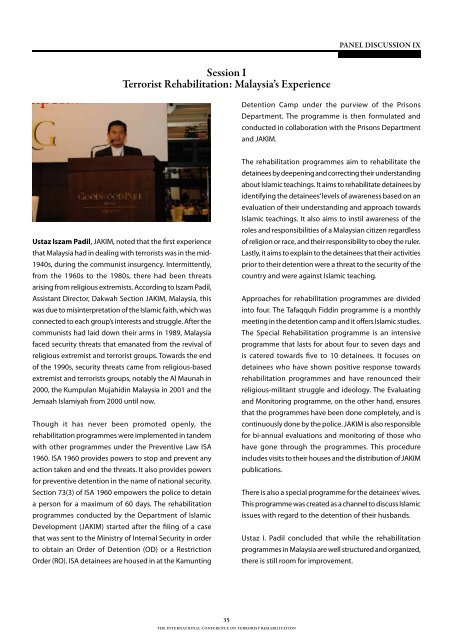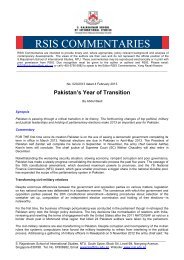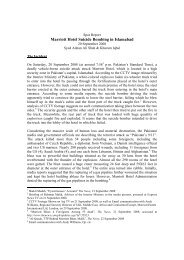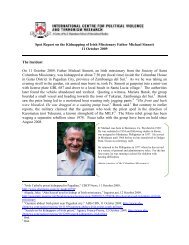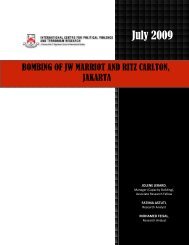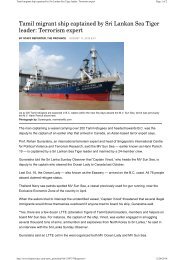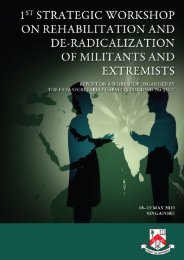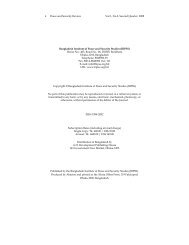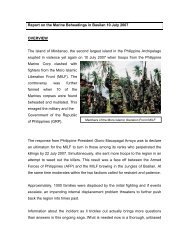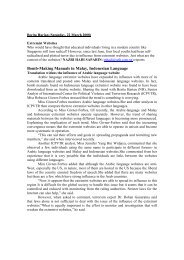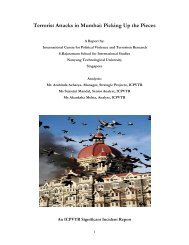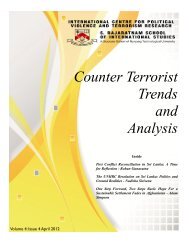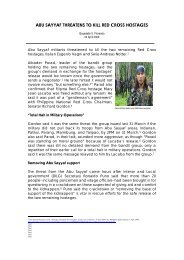International Conference On Terrorist Rehabilitation
International Conference On Terrorist Rehabilitation
International Conference On Terrorist Rehabilitation
You also want an ePaper? Increase the reach of your titles
YUMPU automatically turns print PDFs into web optimized ePapers that Google loves.
PANEL DISCUSSION IX<br />
Session I<br />
<strong>Terrorist</strong> <strong>Rehabilitation</strong>: Malaysia’s Experience<br />
Detention Camp under the purview of the Prisons<br />
Department. The programme is then formulated and<br />
conducted in collaboration with the Prisons Department<br />
and JAKIM.<br />
Ustaz Iszam Padil, JAKIM, noted that the first experience<br />
that Malaysia had in dealing with terrorists was in the mid-<br />
1940s, during the communist insurgency. Intermittently,<br />
from the 1960s to the 1980s, there had been threats<br />
arising from religious extremists. According to Iszam Padil,<br />
Assistant Director, Dakwah Section JAKIM, Malaysia, this<br />
was due to misinterpretation of the Islamic faith, which was<br />
connected to each group’s interests and struggle. After the<br />
communists had laid down their arms in 1989, Malaysia<br />
faced security threats that emanated from the revival of<br />
religious extremist and terrorist groups. Towards the end<br />
of the 1990s, security threats came from religious-based<br />
extremist and terrorists groups, notably the Al Maunah in<br />
2000, the Kumpulan Mujahidin Malaysia in 2001 and the<br />
Jemaah Islamiyah from 2000 until now.<br />
Though it has never been promoted openly, the<br />
rehabilitation programmes were implemented in tandem<br />
with other programmes under the Preventive Law ISA<br />
1960. ISA 1960 provides powers to stop and prevent any<br />
action taken and end the threats. It also provides powers<br />
for preventive detention in the name of national security.<br />
Section 73(3) of ISA 1960 empowers the police to detain<br />
a person for a maximum of 60 days. The rehabilitation<br />
programmes conducted by the Department of Islamic<br />
Development (JAKIM) started after the filing of a case<br />
that was sent to the Ministry of Internal Security in order<br />
to obtain an Order of Detention (OD) or a Restriction<br />
Order (RO). ISA detainees are housed in at the Kamunting<br />
The rehabilitation programmes aim to rehabilitate the<br />
detainees by deepening and correcting their understanding<br />
about Islamic teachings. It aims to rehabilitate detainees by<br />
identifying the detainees’ levels of awareness based on an<br />
evaluation of their understanding and approach towards<br />
Islamic teachings. It also aims to instil awareness of the<br />
roles and responsibilities of a Malaysian citizen regardless<br />
of religion or race, and their responsibility to obey the ruler.<br />
Lastly, it aims to explain to the detainees that their activities<br />
prior to their detention were a threat to the security of the<br />
country and were against Islamic teaching.<br />
Approaches for rehabilitation programmes are divided<br />
into four. The Tafaqquh Fiddin programme is a monthly<br />
meeting in the detention camp and it offers Islamic studies.<br />
The Special <strong>Rehabilitation</strong> programme is an intensive<br />
programme that lasts for about four to seven days and<br />
is catered towards five to 10 detainees. It focuses on<br />
detainees who have shown positive response towards<br />
rehabilitation programmes and have renounced their<br />
religious-militant struggle and ideology. The Evaluating<br />
and Monitoring programme, on the other hand, ensures<br />
that the programmes have been done completely, and is<br />
continuously done by the police. JAKIM is also responsible<br />
for bi-annual evaluations and monitoring of those who<br />
have gone through the programmes. This procedure<br />
includes visits to their houses and the distribution of JAKIM<br />
publications.<br />
There is also a special programme for the detainees’ wives.<br />
This programme was created as a channel to discuss Islamic<br />
issues with regard to the detention of their husbands.<br />
Ustaz I. Padil concluded that while the rehabilitation<br />
programmes in Malaysia are well structured and organized,<br />
there is still room for improvement.<br />
35<br />
THE INTERNATIONAL CONFERENCE ON TERRORIST REHABILITATION


